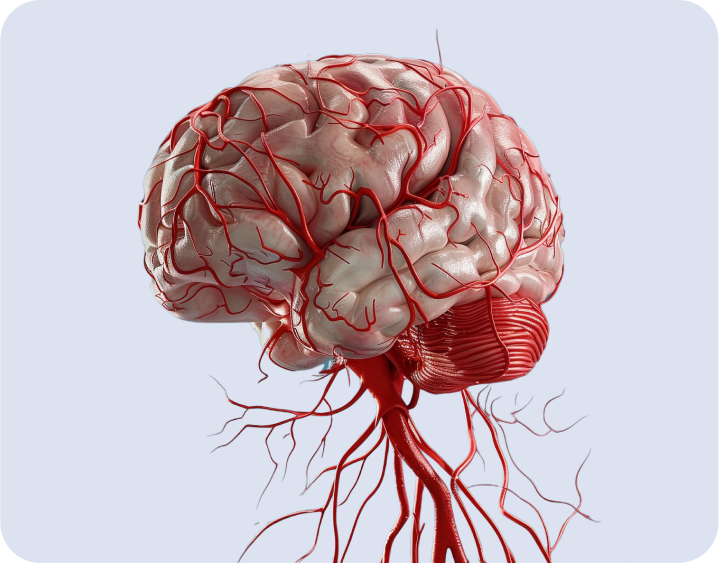Evidence base
Registered on ClinicalTrials
Results of an international multicenter, randomized, double-blind, placebo-controlled study evaluating the efficacy and safety of sequential therapy with ethylmethylhydroxypyridine succinate in patients in the acute and early recovery periods of ischemic stroke (IS)
Registered on ClinicalTrials
N.A. SHAMALOV 1 , A.I. FEDIN 2 , G.S. RAKHIMBAYEVA 3 , E.S. NURGUZHAEV 4 , D.R. KHASANOVA 5 , E.Yu. SOLOVIOVA 2 , E.V. MELNIKOVA 6 , S.N. YANISHEVSKY 7 , V.V. MASHIN 8 , N.V. PIZOVA 9 , I.E. Poverennova 10 , S.E. CHUPRINA 11 , A.S. AGAFINA 12 , L.V. ROSHKOVSKA 13
1 Federal Center for Brain and Neurotechnology of the Federal Medical and Biological Agency of the Russian Federation, Moscow, Russia;
2 Pirogov Russian National Research Medical University, Moscow, Russia;
3 Tashkent Medical Academy, Tashkent, Uzbekistan;
4 Asfendiyarov Kazakh National Medical University, Almaty, Kazakhstan;
5 Kazan State Medical University, Kazan, Russia;
6 Leningrad Regional Center for Medical Rehabilitation, Kommunar, Russia;
7 Almazov National Medical Research Center, Saint Petersburg, Russia;
8 Ulyanovsk State University, Ulyanovsk, Russia;
9 Yaroslavl State Medical University, Yaroslavl, Russia.
10. Samara Regional Clinical Hospital named after V.D. Seredavin, Samara, Russia;
11. Voronezh Regional Clinical Hospital No. 1, Voronezh, Russia;
12. St. Petersburg City Hospital No. 40, St. Petersburg, Russia;
13. St. Petersburg Alexandrovskaya Hospital, St. Petersburg, Russia
Place of publication:
S.S. Korsakov Journal of Neurology and Psychiatry 2025, Vol. 125, No. 8, Issue 2, pp. 40–53
https://doi.org/10.17116/jnevro202512508240
International multicenteric randomized double-tied placebo-controlled study of evaluating the effectiveness and safety of sequential therapy of patients with chronic brain ischemia drugs Mexidol® and Mexidol® Forte 250 (study of memo): Subanalysis results in patients with arterial hypertension
V.V. Zakharov 1 , O.D. Ostroumova 1.2 , A.I. Kochetkov 2 , M.V. Klepikov 2 , A.I. Fedin 3
1 FGAOU VO "First Moscow State Medical University named after THEM. Sechenov »Ministry of Health of Russia (Sechenov University);
2 FSBEI of DPO “Russian Medical Academy of Continuing Professional Education” of the Ministry of Health of Russia, Moscow;
3 FGAOU in Russian National Research Medical University named after N.I. Pirogov »Ministry of Health of Russia, Moscow
Place of publication:
therapy No. 1 (63) 2023
To the question of the evidence base of neuroprotective therapy: Focus on ethylmethylhydroxypyridine succinate
Authors:
A.I. Kochetkov, N.A. Shatalova, M.V. Klepikova, T.V. Filippova, O.D. Ostroumova
FSBEI DPO “Russian Medical Academy of Continuing Professional Education” of the Ministry of Health of Russia, Moscow
The effectiveness of Mexidol in patients of different age groups with chronic brain ischemia with cognitive disorders (the results of subanalysis of the international multicenter randomized double blind placebo-controlled study of memes)
Zakharov V.V. 1*, Tkacheva O.N. 2*, 3*, Mkhitaryan E.A. 2*, 3*, Fedin A.I. 2*
1* FGAOU VO "First Moscow State Medical University named after THEM. Sechenov »Ministry of Health of Russia
(Sechenov University), Moscow, Russia;
2* FGAOU in Russian National Research Medical University named after N.I. Pirogov »Ministry of Health of Russia,
Moscow, Russia;
3* Russian Gerontological Scientific and Clinical Center of the FGAOU in the Russian National Research
Medical University named after N.I. Pirogov »Ministry of Health of Russia, Moscow, Russia
Place of publication:
Journal of neurology and psychiatry named after S.S. Korsakova
2022, vol. 122, No. 11, issue. 2, p. 73–80
Promising Effects of Emoxypine and Its Succinate Derivate in the Management of Various Disess-Withs on Recent Patent Applications
Dhruv Sanjay Gupta, Siddhi Bagwe Parab, Ginpreet Kaur
Translated from Zhurnal Nevrologi I Psikhiatrii Imeni SS Korsakova, Vol. 121, no. 12, ISS. 2, pp. 69–76,
December 2021. Original Article Submitted December 20, 2021. Accepted December 22, 2021.
Place of publication:
Neuroscience and Behavioral Physiology, Vol. 52, no. 5, June, 2022
The results of an international multicenter randomized double-blind-controlled study of evaluating the effectiveness of the effectiveness and safety of consistent therapy of patients with chronic brain ischemia with Mexidol and Mexidol Forte 250 (study of Memo)
Registered on ClinicalTrials
A.I. Fedin 1 , V.V. Zakharov 2 , M.M. Tanashian 3 , E.I. Chukanova 1 , E.N. Majidova 4 , L.A. Shchepankevich 5.6 , O.D. Ostroumova 7
1 FGAOU in Russian National Research Medical University named after N.I. Pirogov »Ministry of Health of Russia, Moscow, Russia;
2 FGAOU VO "First Moscow Medical University named after THEM. Sechenov »Ministry of Health of Russia (Sechenov University), Moscow, Russia;
3 FGBNU "Scientific Center for Neurology", Moscow, Russia;
4 Tashkent Pediatric Medical Institute of the Ministry of Health of the Republic of Uzbekistan, Tashkent, the Republic of Uzbekistan;
5 FSBEI in Novosibirsk State Medical University of the Ministry of Health of Russia, Novosibirsk, Russia;
6 FGBNU "Federal Research Center for Fundamental and Transalized Medicine", Novosibirsk, Russia;
7 FSBEA DPO “Russian Medical Academy of Continuing Professional Education” of the Ministry of Health of Russia, Moscow, Russia
Place of publication:
a journal of neurology and psychiatry named after S.S. Korsakova, 2021, T.121, No. 11
Original and reproduced drugs: what do the clinician need to know?
Author:
A.V. Schulkin, A.A. Filimonova
FSBEI in the Ryazan State Medical University of the Ministry of Health of Russia, Ryazan, Russia
Reproduced drugs: Benefit ratio/risk
E.A. Ushkalova 1 , S.K. Zyryanov 1.2 , I.A. Gopienko 1
1 FGAOU in Russian University of Friendship of Peoples, Moscow;
2 GBUZ in Moscow "City Clinical Hospital No. 24 of the Department of Health of the city of Moscow", Moscow
Pharmacoeconomic analysis of neuroprotectors used in the treatment of ischemic stroke
Authors:
R.I. Yagudin 1 , A.Yu. Kulikov 1 , V.A. Krylov 1 , E.Yu. Soloviev 2 , A.I. Fedin 2
1 FGBU VO "First Moscow State Medical University named after THEM. Sechenov »Ministry of Health of Russia (Sechenov University), Moscow, Russia;
2 FSBI in Russian National Research Medical University named after N.I. Pirogov ", Ministry of Health of Russia, Moscow, Russia
Modern ideas about the antihypoxic and antioxidant effects of Mexidol
Author:
A.V. Schulkin
Results of a Randomized, Double-Blind, Multicenter, Placebo-Controlled, Parallel-Group Study of the Effi Cace and Safety of Mexidol in Prolonged Sequential Therapy of Patient S in the Acute and Early Recovery Stages of Hemisphereic Stroke (The Epica Study)
Authors:
LV Stakhovskaya 1 , Na Shamalov 1 , DR Khasanova 2 , Ev Mel'nikova 3 , AS AGAF'INA 4 , KV Golikov 5 , AA Yakupova 6 , LV Roshkovskaya 7 , LV LUKINYKH 8 , T. M Lokshtanova 9 , Ie Poverennova 10 , La SHEPANKEVICH 11
1 Research Institute of Cerebrovascular Pathology and Stroke, Pirogov Russian National Research Medical University, Russian Ministry of Health, Moscow, Russia.
2 Interregional Clinical Diagnostic Center, Kazan, Russia.
3 St. Petersburg City Clinical Hospital No. 26, St. Petersburg, Russia.
4 St. Petersburg City Clinical Hospital No. 40 of the Resort Administrate District, St. Petersburg, Russia.
5 St. Petersburg City General Hospital no. 2, St. Petersburg, Russia.
6 Kazan Sate Medical University, Russian Ministry of Health, Kazan, Russia.
7 Nikolaevskaya Hospital, St. Petersburg, Russia.
8 Vsevolzhsk Clinical Internal Hospital, Leningradskaya Oblast, Russia.
9 Pirogov City Clinical Hospital No. 1, Samara, Russia.
10 SEREDAVIN SAMARA Regional Clinical Hospital, Samara, Russia.
11 Research Institute of Experimental and Clinical Medicine, Novosibirsk, Russia.
Place of publication:
Neuroscience and Behavioral Physiology, Vol. 48, no. 8, October, 2018
The results of a randomized double blind multicenter placebo-controlled in parallel groups of the study and safety of Mexidol with prolonged consistent therapy in patients in the acute and early recovery periods
Registered on ClinicalTrials
L.V. Stakhovskaya 1 , N.A. Shamalov 1 , DR Khasanova 2 , E.V. Melnikova 3 , A.S. Agafin 4 , K.V. Golikov 5 , E.I. Bogdanov 6 , A.A. Yakupova 6 , L.V. Roshkovskaya 7 , L.V. Lukin 8 , T.M. Lokstanova 9 , I.E. Patrunenova 10 , L.A. Shchepankevich 11
1 Research Institute of Cerebrovascular Pathology and Stroke of the Federal State Budgetary Institution “Russian National Research Medical University named after N.I. Pirogov »Ministry of Health of Russia, Moscow, Russia;
2 Igauz "Interregional Clinical and Diagnostic Center", Kazan, Russia;
3 St. Petersburg GBUZ "City Hospital No. 26", St. Petersburg, Russia;
4 St. Petersburg GBUZ "City Hospital No. 40 of the Resort Administrative District", St. Petersburg, Russia;
5 St. Petersburg GBUZ "City multidisciplinary hospital No. 2", St. Petersburg, Russia;
6 FSBEI in Kazan State Medical University of the Ministry of Health of Russia, Kazan, Russia;
7 St. Petersburg GBUZ "Nikolaev Hospital", St. Petersburg, Russia;
8 GBUZ "Vsevolozhsk Clinical Interdistrict Hospital", Leningrad Region, Russia;
9 Mubz "City Clinical Hospital No. 1 named after N.I. Pirogov ", Samara, Russia;
10 GBUZ "Samara Regional Clinical Hospital named after V.D. Seredavina ”, Samara, Russia;
11 FGBNU "Scientific Institute of Experimental and Clinical Medicine", Novosibirsk, Russia.
Place of publication:
a journal of neurology and psychiatry named after S.S. Korsakova, 2017, No. 3, issue 2
THE INFORMATION IS INTENDED FOR HEALTHCARE AND PHARMACEUTICAL PROFESSIONALS. THIS INFORMATION IS NOT INTENDED AS A SUBSTITUTE FOR MEDICAL ADVICE.
Source of photos and images Shutterstock.com















